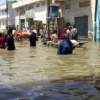In a devastating turn of events, recent strikes conducted by Somalia’s military, allegedly employing Turkish drones, have resulted in the loss of innocent civilian lives. According to a report by the renowned rights watchdog, Amnesty International, twin airstrikes on March 18 struck a farm near Bagdad village in the southern Lower Shabelle region. The aftermath of these strikes was nothing short of catastrophic, with nearly two dozen people losing their lives, including 14 children, and 17 others sustaining injuries, most of whom were children.

The incident has sparked international outrage, with calls for a thorough investigation into what is being labeled as potential “war crimes.” The fragile nation of Somalia, grappling with a relentless Islamist insurgency spanning over 16 years, finds itself under scrutiny once again. Despite the history of defense cooperation between Somalia and Turkey, with Turkey hosting its largest overseas military base and training facility in Somalia, the recent strikes have raised serious questions about the ethics and legality of such operations.
Eyewitnesses described the harrowing scenes that unfolded in the aftermath of the strikes. Mohamed Ali Deerey, who lost his younger brother and nine-year-old nephew in the attack, recounted rushing to the farm upon hearing the initial blast, only to witness the devastating aftermath of the second strike. “The scene was chaotic. There were screams, blood, and bodies all over the ground,” he said, capturing the sheer horror of the situation.
The victims of these strikes were not merely statistics; they were families torn apart, lives shattered in an instant. One survivor, who lost six members of their family, expressed sheer horror at the inhumane nature of the attack, rightly labeling it a massacre. The targeted families, belonging to the marginalized Gorgaarte clan, represent yet another instance of civilians bearing the brunt of conflict in war-torn Somalia.
Amnesty International has called upon both the Somali and Turkish governments to conduct a thorough investigation into the incident, urging them to classify these strikes as war crimes and to cease reckless attacks on civilians immediately. However, the response from the involved governments has been conspicuously silent, with no official acknowledgment or response to the allegations.
Somalia’s government, while acknowledging conducting operations targeting Al-Shabaab in the same area, has remained tight-lipped about any civilian casualties. The lack of transparency and accountability in such matters only exacerbates the suffering of innocent civilians caught in the crossfire of conflict.
The timing of these strikes is particularly troubling, considering the recent maritime defense deal signed between Somalia and Turkey in February of the same year. Additionally, Turkey’s involvement in training Somali soldiers to replace the departing African Union peacekeeping mission troops underscores the complexity of the situation.
Although Al-Shabaab was forced out of Mogadishu in 2011 by an African Union force, the jihadist group continues to maintain a stronghold in rural Somalia, perpetrating numerous attacks against political, security, and civilian targets. The cycle of violence seems unending, with civilians paying the highest price for the ongoing conflict.
As the international community grapples with the implications of these strikes, it is imperative to prioritize the protection of civilian lives above all else. The tragedy in Bagdad village serves as a stark reminder of the urgent need for accountability, justice, and a renewed commitment to peace in Somalia. Only through collective action and unwavering dedication to human rights can we hope to prevent such senseless loss of life in the future.












